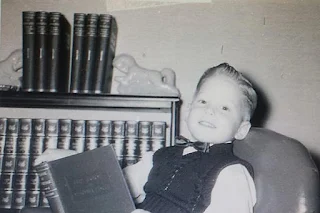I sat on plastic covered benches waiting for word on my sister's little dog, Smokie, who had quickly become very, very sick that afternoon. When her regular vet's receptionist told me they could not see her until the next afternoon, I rushed her to the emergency animal hospital. (Just a word of warning. If you have to do this, bring lots and lots of money.)
After the doctor had spent an hour examining Smokie, he came out and told me it would take a while to do lab work and diagnose her.
I sat and listened to Bill Clinton speak on TV. A noisy family arrived with their dog that had been bitten by a copperhead snake. They had just moved to the area and were immigrants from the far east. The children spoke English fluently, but the father spoke with a heavy accent.
While he cut tall grass that afternoon, he disturbed a snake, and the dog attacked it. Bad idea. The father did not see the bite, but heard the dog yelp. He killed the snake and identified it.
The vet said he would keep the pet and watch it over night to see if he needed to give anti-venom. I thought if anyone was bitten by a snake, the cure was to give anti-venom.
The father spoke loud to be heard above the five kids who were jabbering like magpies. "I never saw where the snake bit him, but I heard him yelp.
The doctor said a copperhead bite was painful and not as deadly as a rattlesnake or some other snakes."
I never thought I'd get a lesson in snake bites while sitting in an animal hospital at 10 o'clock at night.
The receptionist, an older woman smiled and spoke in a gentle voice, understanding of my situation. We talked for a time. She didn't need to tell me she enjoyed her job. She had quit work a couple of years ago, but could not handle retirement. She came back to the pet hospital and works all night, from 6:00 p.m. until 8:00 a.m.. As I listened to her on the telephone and with people who came in with their pets, I wished our young people who work in a situation where they must communicate with the public could take lessons from this lovely woman.
I heard that her husband died when he was 49 years old and left her with two small children. She said she thought she was going to die, and without help from her family, she was not sure she would have made it. My heart hurt for her.
I picked up Smokie at 7:30 a.m. this morning. She still had bloody feces and I was given a bag full of fluids for her regular doctor to continue her care. I was told to take her directly there where her records are in their files. The Emergency Hospital FAXED a report.
I arrived at the vet's office before it opened. I stood there holding the little Schnauzer in a blanket in my arms. When the doors opened at 8:00 the young woman behind the desk told me the veterinarian would not see her until later because I didn't have an appointment for the morning.
"Would you like to leave her with us?" She asked.
"I was told by the people at the emergency hospital to bring her here now and they would FAX her records over. Do you have her records?"
"Oh, let me see." She pulled some papers off a machine and read them as if she wasn't sure what they were.
"Is this Smokie?"
"Yes," I said, tired from having climbed a long ramp carrying Smokie to get to the door. No one offered to help.
I was shown to a room and after talking to another young woman who put notes into her computer, Smokie was taken from me. I asked to speak to the doctor, but was told she was not available. I was told that I would be called later.
I wish the older woman at the ER could take the first young woman and give her some lessons in how to behave to a client, how to communicate with a caring attitude, and how to recognize when an older person is in distress.
I would hire a receptionist with people skills to represent the face of the business. I never met the veterinarian, but her staff did not make a good impression. I pray that she is a good doctor and that Smokie will get all the help she needs.
Later:
I was called by one of the techs to pick up Smokie that afternoon. I still did not see the veterinarian or even get a call from her. Thankfully, by the time my sister and brother-in-law got home from their vacation, Smokie was doing fine. After they heard my story, Gay and Stu sought another doctor for their dogs, one they feel is caring and understands the owners as well as the pets. And - they like the staff.
What do you look for in a doctor's office staff, for you or for your pet?
Later:
I was called by one of the techs to pick up Smokie that afternoon. I still did not see the veterinarian or even get a call from her. Thankfully, by the time my sister and brother-in-law got home from their vacation, Smokie was doing fine. After they heard my story, Gay and Stu sought another doctor for their dogs, one they feel is caring and understands the owners as well as the pets. And - they like the staff.
What do you look for in a doctor's office staff, for you or for your pet?




